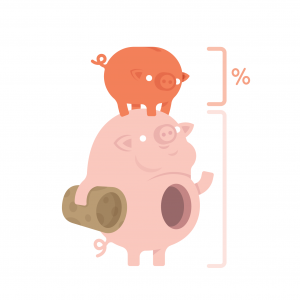What Does it Mean if Interest Rates Rise?
Published: 7th November 2017
Does last week’s interest rate rise spell good news or bad?
We look at the significance of the Bank of England base rate, and what the increase means for:
savers
borrowers
homeowners
homebuyers
students and graduates.
What is interest?
Interest is the fee paid by a borrower to a lender for using their money, and is expressed as a percentage of the amount borrowed (i.e. the annual interest rate).
Some borrowing has a variable interest rate, which means it will fluctuate up and down in line with the Bank of England base rate or competitive market forces.Other interest rates are fixed for a set period and will not change, no matter what happens to market interest rates.
Find out more about interest rates here.
The News in Brief
The Bank of England has raised the base rate from 0.25% to 0.5%.
Whist it’s the first rise in over a decade, historically it is still a very low rate. A couple more gradual rises are expected over the next few years, taking the base rate to 1%.
Why is the base rate significant?
The Bank of England base rate is the official interest rate they will charge to lend money to other banks and financial institutions. The Bank of England sets the base rate and commercial interest rates tend to follow that, so it influences what borrowers pay and what savers earn.
By changing the base rate, the Bank of England can influence the state of the economy. They might increase interest rates to slow inflation and consumer demand and reduce the rate of economic growth. In this instance their main aim is to lower inflation (to a 2% target), after the UK Retail Price Index (RPI) rose to 3% in September.
How Will a Rise in Interest Rates Affect You?
Savers
 An interest rate rise is good news – savings will accrue more interest and be worth slightly more. So people may be tempted to save rather than spend their money.
An interest rate rise is good news – savings will accrue more interest and be worth slightly more. So people may be tempted to save rather than spend their money.
Note: If you have a fixed rate savings account, there will be no change because your interest rate will not increase.
But most savings have variable rates, so savers should earn marginally higher returns from their savings accounts.
A saver with £10,000 in a typical cash ISA (Individual Savings Account), or an average Easy Access savings account, would collect an extra £25 interest over a year.
It’s also likely there will be better rates on savings deals for new customers. Do check what rate you’re being paid and consider switching if you can earn higher rates elsewhere.
Find out more on savings here, including interest payments, choosing the right type of account and managing your savings.
Borrowers
 A rise in interest rates is bad news – the cost of borrowing goes up.
A rise in interest rates is bad news – the cost of borrowing goes up.
Anyone with existing debts that charge a variable interest rate (e.g. overdrafts, some loans, credit cards and store cards) will have to pay higher monthly interest payments and so the overall cost of the debt also increases.
When borrowers have to spend more on interest payments, they will have less disposable income, so this reduces consumer spending on other goods.
For fixed rate borrowing (e.g. most personal loans and some credit cards), there will be no change until you reach the end of that fixed-rate term.
But for any new borrowing, interest rates are expected to be higher, making it more expensive, so people are likely to be discouraged from borrowing. Credit cards interest rates have already started to rise and are at a record high level, with fewer deals available (e.g. introductory interest-free period).
Find out more about the cost of borrowing here.

Homeowners & Homebuyers
Bad news, as mortgage rates will rise.
Homeowners with an existing mortgage
With variable rate mortgages, homeowners face higher monthly repayments and so the overall cost of their mortgage increases.
If you have a Standard Variable Rate (SVR) mortgage, the rate can change at the discretion of the lender (and it’s likely to reflect the general rise in interest rates).
If you’re on a Tracker rate, your mortgage will definitely be more expensive, because the rate you pay moves up and down in line with the Bank of England base rate, either for a set period or for the life of the mortgage.
‘Millions of people on variable mortgages will see a direct increase in cost of roughly £200 a year per £100,000 of outstanding mortgage.’
Mortgages tend to be a major expenditure, so people will have less disposable income and this in turn has a big impact on consumer spending. In extreme cases, mortgage borrowers could struggle to afford their increased monthly repayments and will have to sell their home, or worse still, could have it repossessed by the mortgage lender. But stricter lending regulations in recent years, mean this should rarely happen.
If you have a fixed-rate mortgage deal, where you pay an agreed rate for a set period (typically 2 or 5 years), nothing will change until you reach the end of that fixed-rate term; but once your deal ends, you may pay more for the next one.
New homebuyers
Mortgages will be more expensive, so this is likely to deter people from buying a first home. More people will continue to live at home or rent (which in turn could drive up rental prices in areas where demand exceeds supply).
If you are planning on applying for a mortgage, it’s definitely worth shopping around for the best rates. The larger your deposit, or amount of equity you own in a property, the better the rate you’re likely to secure. Also be aware that your student loan may affect the deal you’re offered, because loan commitments will be taken into account when lenders assess the affordability of mortgage repayments.
Student Loans
Note: The following info relates to undergraduate loans taken out since September 2012 (Plan 2). For any other type of student loan, please click here.
The student loan rate is fixed until August 2018.
It is based on the RPI (rate of inflation), not on the Bank of England base rate.
The Interest rate you pay on student loans is set every September, and is based on the RPI rate of inflation in the year up to the previous March. In March 2017, the inflation rate had jumped to 3.1%, and the September 2017 student loan rate increase to 6.1% (RPI +3%) was solely due to this rise in inflation.

Remember the interest added to your loan depends on what you earn, not on what you borrowed. Your outstanding loan amount incurs interest during university and after graduation:
While you’re studying, interest is charged at RPI inflation + 3% (= 6.1% for academic year 2017-18)
After graduation, the rate charged is linked to your earnings; it ranges from the basic interest rate equivalent to RPI (3.1%) up to the top rate of RPI + 3% (6.1%) for higher earners.
Find out here what interest rate you pay on your student loan.
Click here for an update on the recent changes to tuition fees and student loans.
Find out more
UK interest rates rise – Money Saving Expert
Includes the latest on how individual banks are changing their mortgage & savings rates


Please log in or sign up to comment